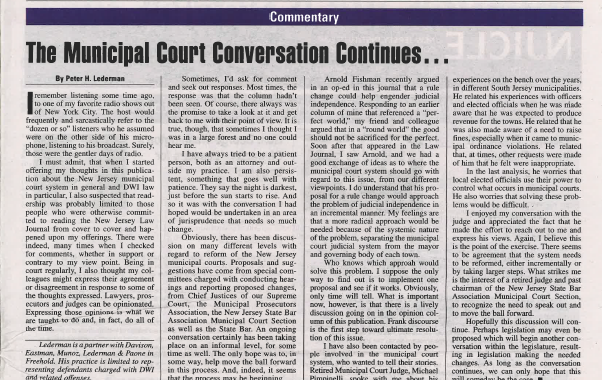OP-ED: Peter Lederman talks about expressing opinions in The NJ Law Journal about the New Jersey Municipal Court system.
Article by Peter H. Lederman, Esq.
Published in the New Jersey Law Journal
I remember listening some time ago, to one of my favorite radio shows out of New York City. The host would frequently and sarcastically refer to the “dozen or so” listeners who he assumed were on the other side of his microphone, listening to his broadcast. Surely, those were the gentler days of radio.
I must admit, that when I started offering my thoughts in this publication about the New Jersey Municipal Court system in general and DWI law in particular, I also suspected that readership was probably limited to those people who were otherwise committed to reading the New Jersey Law Journal from cover to cover and happened upon my offerings. There were indeed, many times when I checked for comments, whether in support or contrary to my viewpoint. Being in Court regularly, I also thought my colleagues might express their agreement or disagreement in response to some of the thoughts expressed. Lawyers, Prosecutors, and Judges can be opinionated. Expressing those opinions is what we are taught to do and in fact, do all of the time.
Sometimes, I’d ask for comment and seek out responses. Most times, the response was that the column hadn’t been seen. Of course, there always was the promise to take a look at it and get back to me with their point of view. It is true, though that sometimes I thought I was in a large forest and no one could hear me!
I have always tried to be a patient person, both as an attorney and outside my practice. I am also persistent, something that goes well with patience. They say the night is darkest, just before the sun starts to rise. And so it was with the conversation I had hoped would have been undertaken in an area of jurisprudence, which needs so much change for the better.
Obviously, there has been discussion on many different levels with regard to reform of the New Jersey Municipal Court. Proposals and suggestions have come from special committees charged with conducting hearings and reporting proposed changes, from Chief Justices of our Supreme Court, the Municipal Prosecutors Association, the New Jersey State Bar Association Municipal Court Section as well as the State Bar. An ongoing conversation certainly has been taking place on an informal level, for some time as well. The only hope was to in some way, help move the ball forward in this process. And indeed, it seems that that process may be beginning to occur.
The recent comments of Arnold Fishman, who argued Op-Ed in this Journal that a Rule change could help engender judicial independence. Responding to an earlier column that referenced a “perfect world” my friend and colleague argued that in a “round world” the good should not be sacrificed for the perfect. Soon after that appeared in the Journal, I saw Arnold and had a good exchange of ideas as to where the Municipal Court system should go with regard to this issue, from our different viewpoints. I do understand that his proposal for a Rule change would approach the problem of judicial independence from an incremental approach. My feelings are that, a more radical approach would be needed because of the systemic nature of the problem separating the Municipal Court judicial system from the Mayor and governing body of each town.
Who knows which approach is going to solve this problem. I suppose the only way to find out is to implement one proposal and see if it works. Obviously, only time will tell. What is important now however, is that there is a lively discussion going on in the opinion columns of this Law Journal. Frank discourse is the first step in ultimate resolution of this issue.
I have also been contacted by people involved in the Municipal Court system over the years, who wanted to tell their stories. Ret. Municipal Court Judge, Michael Pimpinelli, spoke with me about his experiences on the Bench over the years, in different South Jersey Municipalities. He related his experiences with Officers and elected officials, when he was made aware that he was expected to produce revenue for the towns. He related that he was also made aware of a need to raise fines, especially when it came to Municipal Ordinance violations. He related that at times, other requests were made of him that he felt were inappropriate.
In the last analysis, he worries that local elected officials use their power to control what occurred in Municipal Courts. He also worries that solving these problems would be difficult.
I enjoyed my conversation with the Judge and appreciated the fact that he made the effort to reach out to me and express his views. Again, I believe this is the point of the exercise. There seems to be agreement that the system needs to be reformed, either incrementally or by taking larger steps. What strikes me is the interest of a retired Judge and Past Chairmen of the New Jersey State Bar Association Municipal Court Section, to recognize the need to speak out and to move the ball forward.
Hopefully this discussion will continue. Perhaps legislation may even be proposed which will begin another conversation within the Legislature, resulting in legislation making the needed changes. As long as the conversation continues, we can only hope that this will someday be the case.
About the Author
Peter Lederman, Esq is an attorney and partner with the law firm of Lomurro Law. Peter represents drivers charged with DWI in Courts throughout the State of New Jersey. His practice is and has been limited to the exclusive representation of defendants charged with Driving While Intoxicated and other related offenses.
